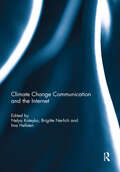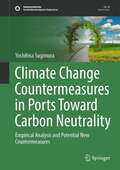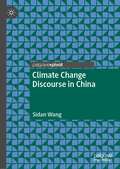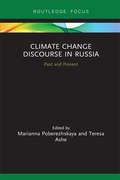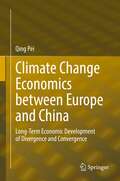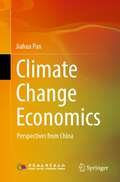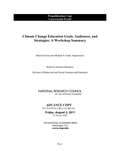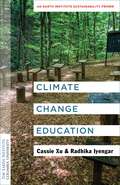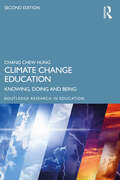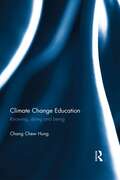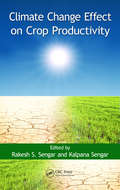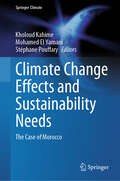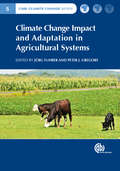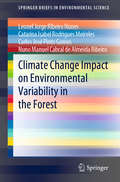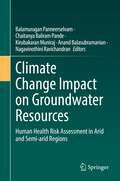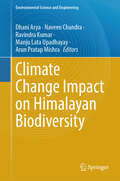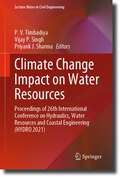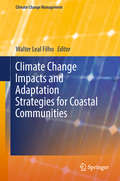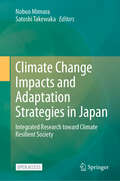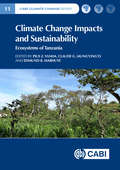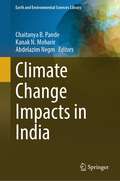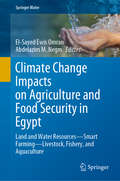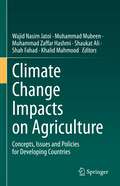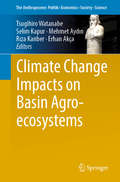- Table View
- List View
Climate Change Communication and the Internet
by Nelya Koteyko, Brigitte Nerlich and Iina HellstenThe volume provides a timely, state of the art collection of studies examining climate change communication in the era of digital media. The chapters focus on a broad range of topics covering various aspects of both practice and research in climate change communication, ranging from the use of online platforms, to blogs, and social networking sites. Climate change communication has increasingly moved into Internet-based forums, and this volume provides a comprehensive overview of research into Internet and climate change communication. The studies share valuable methodological insights in this relatively new field of research and shed light on the opportunities and challenges underlying the collection and analysis of online climate change-related data. This book was previously published as a special issue of Environmental Communication.
Climate Change Countermeasures in Ports Toward Carbon Neutrality: Empirical Analysis and Potential New Countermeasures (Sustainable Development Goals Series)
by Yoshihisa SugimuraThis book presents an in-depth examination of the challenges facing the port industry in reducing CO2 emissions. Through empirical studies and real-world data, it explores the energy consumption of cargo handling machinery and reefer containers, and introduces new technologies and methods for reducing emissions. With a focus on practical application, the book provides a valuable resource for port managers and stakeholders looking to implement effective climate change countermeasures. It also serves as a valuable resource for researchers studying ports and climate change.
Climate Change Discourse in China
by Sidan WangThis book focuses on the politics, discourse and actors surrounding climate change issues in China. This framework offers a new way of observing Chinese discourses around climate change. Discursive changes in coal consumption and air pollution have been raised to uncover the various motivations of China towards addressing climate issues. This book will be of interest to a variety of different stakeholders including policy-makers, non-state actors, business communities and media, and anyone who are interested in the climate governance of China.
Climate Change Discourse in Russia: Past and Present (Routledge Focus on Environment and Sustainability)
by Marianna Poberezhskaya Teresa AsheThis book explores the development of climate change discourses in Russia. It contributes to the study of climate change as a cultural idea by developing the extensive Anglophone literature on environmental science, politics and policy pertaining to climate change in the West to consider how Russian discourses of climate change have developed. Drawing on contributors specialising in numerous periods, regions, disciplines and topics of study, the central thread of this book is the shared attempt to understand how environmental issues, particularly climate change, have been understood, investigated and conceptualised in Soviet and post-Soviet Russia. The chapters aim to complement work on the history of the discursive political construction of climate change in the West by examining a highly contrasting (but intimately related) cultural context. Russia remains one of the world’s largest greenhouse gas emitters with one of the most carbon-intensive economies. As the world begins to suffer the extreme consequences of anthropogenic climate change, finding adequate solutions to global environmental problems necessitates the participation of all countries. Russia is a central actor in this global process and it, therefore, becomes increasingly important to understand climate change discourse in this region. Insights gained in this area may also be illuminating for examining environmental discourses in other resource rich regions of the world with alternative economic and political experiences to that of the West (e.g. China, Middle East). This book will be of great interest to students and scholars of Russian environmental policy and politics, climate change discourses, environmental communication and environment and sustainability in general.
Climate Change Economics between Europe and China: Long-Term Economic Development of Divergence and Convergence
by Qing PeiThis book is the first attempt to highlight the Great Divergence between Europe and China from the perspective of environmental change. The author discusses the agrarian economy while considering the effects of climate change in both Europe and China at a long-term scale. The findings in the book supplement current knowledge and discussion on the Great Divergence across Eurasia. The book further aims to empirically review the climatic impacts on the human community in the past as the relevant historical reference by which to understand human–nature linkages in the current Anthropocene epoch. The statistical analysis in the book will contribute to the development of relevant subjects, such as environmental humanities, quantitative history, and historical geography. The book thus is suitable to all levels of students, undergraduate and postgraduate, in the university. In summary, by combining multiple disciplines in both methods and knowledge, this book becomes an interesting reference to students, academic staff, and even the general public. It may also appeal to policymakers, who aim to address the impacts of climate change according to past societal experiences.
Climate Change Economics: Perspectives from China
by Jiahua PanThis book establishes theories and methods of climate change economics based on the perspective of human development. The book, in two volumes, consists of papers and research reports authored by Pan Jiahua or researchers under his guidance. Professor Pan Jiahua is a leading figure in the field of political economy in climate change and has written extensively. The book is divided into four parts, covering theories, methods, governance, and policies. • The theory part includes the general economics of climate change, the political economy of climate change, carbon emissions, and human development. • The method part covers the economic analysis of greenhouse gas reduction and economics of low-carbon economic development. • The governance is on the design and construction of international climate regimes and China's role and choice. • Finally, the policy part consists of three chapters: policy choices for low-carbon transformation, energy-saving emission reduction, and low-carbon development and adaptation to climate change. The disciplines involved in climate change economics include welfare economics, development economics, international political economics, and property rights economics. In the context of multidisciplinary cross-cutting, the economics of climate change has evolved. The book proposes theories, methods and offers policy solutions and cases. It is of high academic and empirical value for developing countries to strive for fair rights and interests in international climate negotiations, obtain development space, and pursue a low-carbon and ecological economy. Professor Jiahua Pan and his team at the Chinese Academy of Social Sciences have contributed greatly to the development of climate change economics in China. Their work has laid the foundation of climate change economics from basic concepts, frameworks, and systems and has a great significance in promoting the development of climate change economics.
Climate Change Education
by National Research Council Division of Behavioral and Social Sciences and Education Board on Environmental Change and Society Board on Science Education Michael A. Feder Sherrie ForestThe global scientific and policy community now unequivocally accepts that human activities cause global climate change. Although information on climate change is readily available, the nation still seems unprepared or unwilling to respond effectively to climate change, due partly to a general lack of public understanding of climate change issues and opportunities for effective responses. The reality of global climate change lends increasing urgency to the need for effective education on earth system science, as well as on the human and behavioral dimensions of climate change, from broad societal action to smart energy choices at the household level. The public's limited understanding of climate change is partly the result of four critical challenges that have slowed development and delivery of effective climate change education. As one response to these challenges, Congress, in its 2009 and 2010 appropriation process, requested that the National Science Foundation (NSF) create a program in climate change education to provide funding to external grantees to improve climate change education in the United States. To support and strengthen these education initiatives, the Board on Science Education of the National Research Council (NRC) created the Climate Change Education Roundtable. The Roundtable convened two workshops. Climate Change Education Goals, Audiences, and Strategies is a summary of the discussions and presentations from the first workshop, held October 21 and 22, 2010. This report focuses on two primary topics: public understanding and decision maker support. It should be viewed as an initial step in examining the research on climate change and applying it in specific policy circumstances.
Climate Change Education: An Earth Institute Sustainability Primer (Columbia University Earth Institute Sustainability Primers)
by Radhika Iyengar Luo Cassie XuClimate change affects every person and society, every community and industry. Education at all levels, in all disciplines, and both inside and outside official institutions must now address climate change and its many effects on social and environmental systems. This book provides a framework for putting climate change at the forefront of educational agendas and pedagogical tools for teaching climate science across local and global settings.Cassie Xu and Radhika Iyengar present evidence-based teaching practices and strategies that are grounded in a broad conception of education and emphasize a systems approach. They share examples of effective approaches in diverse learning environments—not just in classrooms and other formal settings but also informal contexts with communities and families. This book makes the case that students and other learners need to understand climate science and the physical and social impacts of climate change not only to be good citizens but also to be well prepared for different career paths. Xu and Iyengar highlight systemic barriers and inequalities, reflecting on how to bring marginalized voices and perspectives into educational spaces. Providing a foundation for interdisciplinary environmental education, this book underscores that how we teach future generations about climate change will shape our future.
Climate Change Education: Knowing, Doing and Being (Routledge Research in Education)
by Chang Chew HungClimate change is complex and there is a need to educate our future generations so that they are able to deal with the plethora of information and views that they come into contact with in their lives. This book inquires into what it means to teach and learn about climate change. Now in its second edition, Chang further explores what education for climate change entails, discussing the concept of climate change education (CCE) itself, how it is taught in schools and how public education is being carried out. Featuring updated literature in a quickly advancing field, the book defines CCE for the global citizen and looks at pedagogies supporting CCE. It also identifies teachers as key stakeholders in climate change discourse, how to improve teacher readiness on the topic and how teacher professional development can support successful implementation of CCE. This book will be invaluable to climate change educators and can act as a reference resource for teachers, education policymakers and public education agencies.
Climate Change Education: Knowing, doing and being (Routledge Research in Education)
by Chang Chew HungClimate change is a controversial topic; some people assert that climate change is not occurring, and others believe that reports are inaccurate, that whilst climate change is happening, it may not be caused by human activity. There are also climate alarmists who use IPCC reports to support their claims that erratic weather patterns are a result of climate change caused by human activity. Regardless of these different viewpoints, one fact can be agreed upon; climate change is a complex subject and there is a need to educate future generations, enabling them to deal with the plethora of information and views that they will experience in their lives. This book explores what education for climate change entails, discussing the concept of Climate Change Education (CCE) itself, how it can be taught in schools and how public education can be carried out. It instructs what specific subject matter to teach for CCE, and how to evaluate the student learning on the subject. Chapters include: CCE in the Formal Curriculum Teacher readiness for CCE Assessment for and of CCE Lessons from CCE for Public Education Climate Change Education is an extremely useful resource for anyone involved in educating students on climate change and also for those interested in climate change itself.
Climate Change Effect on Crop Productivity
by Rakesh S. Sengar Kalpana SengarExplore the Relationship between Crop and ClimateAgricultural sustainability has been gaining prominence in recent years and is now becoming the focal point of modern agriculture. Recognizing that crop production is very sensitive to climate change, Climate Change Effect on Crop Productivity explores this timely topic in-depth. Incorporating contri
Climate Change Effects and Sustainability Needs: The Case of Morocco (Springer Climate)
by Kholoud Kahime Mohamed El Yamani Stéphane PouffaryThis book provides simultaneously, a cross-sectoral, multi-scale assessment of climate change issues in Morocco and proposes levers of action and innovative practices to be used to strengthen the resilience and adaptation strategies. The book offers the opportunity to debate contemporary mutations, the paradigms of change as a complex process, the dynamics of values, the complexity of the issues and the opportunities for transformation, starting from a reflective approach on the historical, scientific, theoretical and strategic dimensions of action, creativity and environmental innovation in a perspective of sustainability.
Climate Change Impact and Adaptation in Agricultural Systems
by Pablo A Pablo A Robert J Robert J Julie Julie Temesgen Tadesse Temesgen Tadesse Heidi Heidi Anil Anil Elan Elan Kindie Kindie Ni’matul Ni’matul John F John F Rachmat Rachmat Phillip Phillip Uran Uran Markku Markku Henry Henry Frank Frank Kurniatun Kurniatun Jules Jules Jørgen E Jørgen E Clare Clare Jill Jill Bram Bram Meine Van Noordwijk P Gregory Brian Keating Mark Mark Laun W Laun W Himanshu Himanshu Jurg Fuhrer Fujiang Fujiang Chris Chris Catherine Catherine Betha Betha Jon Jon Steven Steven Serena Serena Richard Richard Reimund Reimund Helena Helena Kai Kai Pablo Pablo Alan Franzluebers Sika Sika Rachael A Rachael A Mark A Mark A Walter A Walter A H Matthew Reynolds Lauren Lauren Rosemary Rosemary Nele NeleThe focus of this book is future global climate change and its implications for agricultural systems which are the main sources of agricultural goods and services provided to society. These systems are either based on crop or livestock production, or on combinations of the two, with characteristics that differ between regions and between levels of management intensity. In turn, they also differ in their sensitivity to projected future changes in climate, and improvements to increase climate-resilience need to be tailored to the specific needs of each system. The book will bring together a series of chapters that provide scientific insights to possible implications of projected climate changes for different important types of crop and livestock systems, and a discussion of options for adaptive and mitigative management.
Climate Change Impact and Adaptation in Agricultural Systems (CABI Climate Change Series #15)
by Pablo A Pablo A Robert J Robert J Julie Julie Temesgen Tadesse Temesgen Tadesse Heidi Heidi Anil Anil Elan Elan Kindie Kindie Ni’matul Ni’matul John F John F Rachmat Rachmat Phillip Phillip Uran Uran Markku Markku Henry Henry Frank Frank Kurniatun Kurniatun Jules Jules Jørgen E Jørgen E Clare Clare Jill Jill Bram Bram Meine Van Noordwijk Brian Keating Mark Mark Laun W Laun W Himanshu Himanshu Fujiang Fujiang Chris Chris Catherine Catherine Betha Betha Jon Jon Steven Steven Serena Serena Richard Richard Reimund Reimund Helena Helena Kai Kai Pablo Pablo Alan Franzluebers Sika Sika Rachael A Rachael A Mark A Mark A Walter A Walter A H Matthew Reynolds Lauren Lauren Rosemary Rosemary Nele NeleThe focus of this book is future global climate change and its implications for agricultural systems which are the main sources of agricultural goods and services provided to society. These systems are either based on crop or livestock production, or on combinations of the two, with characteristics that differ between regions and between levels of management intensity. In turn, they also differ in their sensitivity to projected future changes in climate, and improvements to increase climate-resilience need to be tailored to the specific needs of each system. The book will bring together a series of chapters that provide scientific insights to possible implications of projected climate changes for different important types of crop and livestock systems, and a discussion of options for adaptive and mitigative management.
Climate Change Impact on Environmental Variability in the Forest (SpringerBriefs in Environmental Science)
by Leonel Jorge Nunes Catarina Isabel Meireles Carlos José Pinto Gomes Nuno Manuel de Almeida RibeiroThis book discusses the impact of climate change on rural forest areas. It analyses data provided by the Portuguese Institute of the Sea and Atmosphere (IPMA) to not only demonstrate that climate change has occurred in Portuguese forests, but also to suggest how forestry practices can be adapted to minimise its effects. In turn, the book distils data collected over several years into a comprehensive and coherent review of the ways in which the climate has changed in Portugal. It addresses the changes in rainfall, temperatures, and climatic anomalies, and how these changes correlate with effects such as rural forest fires. Though the text chiefly focuses on Portugal, the tools implemented are easily transferable to other countries and regions, making it relevant to readers around the globe. The book offers a valuable asset for students, researchers, foresters and those working at environmental (research) institutions.
Climate Change Impact on Groundwater Resources: Human Health Risk Assessment in Arid and Semi-arid Regions
by Chaitanya Baliram Pande Balamurugan Panneerselvam Kirubakaran Muniraj Anand Balasubramanian Nagavinothini RavichandranThis volume discusses climate change impacts on groundwater quality in arid and semi-arid regions, and provides human health risk assessments due to pollution of surface and groundwater. The book presents recent trends in monitoring groundwater management and implementing pollution mitigation strategies, including practices involving remote sensing and GIS techniques, entropy water quality index, weighted arithmetic water quality index, fuzzy logic applications, and improved irrigation methods. The book also outlines hydrological processes in arid and semi-arid regions and hydrochemical properties of surface and groundwater as a necessary background for understanding how pollution impacts groundwater quality and resources, and how geographical modeling of hydrological processes can aid in human health risk assessments. The book is intended for academics, administrators, policymakers, social scientists, and professionals involved in the various aspects of climate change impact on groundwater quality, hydrological process, pollution mitigation strategies, sustainable development, and environmental planning and management.
Climate Change Impact on Himalayan Biodiversity (Environmental Science and Engineering)
by Ravindra Kumar Naveen Chandra Arun Pratap Mishra Dhani Arya Manju Lata UpadhayayThis book is an informative and profound book that explores the impact of climate change on the unique and delicate environment of the Himalayan region. The book meticulously examines the different plants and animals that live there and how they are affected by changing temperatures and weather patterns. The book showcases how species are changing their habits and distribution patterns and what this means for the future of the Himalayan environment. The book also provides practical suggestions for how local communities and policymakers can work together to protect the region's biodiversity for the future. Overall, this book is an excellent resource for researchers and academics who are interested in learning more about the environmental impacts of climate change on the Himalayan region. The book is written in a clear and accessible manner, making it easy for anyone to understand the profound implications of climate change on this unique and sensitive environment.
Climate Change Impact on Water Resources: Proceedings of 26th International Conference on Hydraulics, Water Resources and Coastal Engineering (HYDRO 2021) (Lecture Notes in Civil Engineering #313)
by Vijay P. Singh P. V. Timbadiya Priyank J. SharmaThis book comprises the proceedings of the 26th International Conference on Hydraulics, Water Resources and Coastal Engineering (HYDRO 2021) focusing on broad spectrum of emerging opportunities and challenges on the impact of climate change on water resources. It covers a range of topics, including, but not limited to, climate change assessment and downscaling issues, climate change impact and adaptive measures, influence of climate variability on hydro-climatic variables, impact of climate change on water resources of Indian Rivers, etc. Presenting recent advances in the form of illustrations, tables, and text, the content offers readers insights for their own research. In addition, the book addresses fundamental concepts and studies on the impact of climate change on water resources, making it a valuable resource for both beginners and researchers wanting to further their understanding of hydraulics, water resources and coastal engineering.
Climate Change Impacts and Adaptation Strategies for Coastal Communities (Climate Change Management)
by Walter Leal FilhoThis book presents a comprehensive overview of research and projects regarding climate change adaptation in coastal areas, providing government and nongovernment bodies with a sound basis to promote climate change adaptation efforts. According to the 5th Assessment Report by the Intergovernmental Panel on Climate Change (IPCC), coastal zones are highly vulnerable to climate change, and climate-driven impacts may be further exacerbated by other human-induced pressures. Apart from sea-level rise, which poses a threat to both human well-being and property, extreme events such as cyclones and storm surges lead not only to significant damage to property and infrastructure, but also to salt water intrusion, groundwater salinisation, and intensified soil erosion, among many other problems. There are also numerous negative impacts on the natural environment and biodiversity, including damage to important wetlands and habitats that safeguard the overall ecological balance, and consequently the provision of ecosystem services and goods on which the livelihoods of millions of people depend. As such, there is a need for a better understanding of how climate change affects coastal areas and communities, and for the identification of processes, methods and tools that can help the countries and communities in coastal areas to adapt and become more resilient. It is against this background that this book has been produced. It includes papers written by scholars, social movements, practitioners and members of governmental agencies, pursuing research and/or executing climate change projects in coastal areas and working with coastal communities. Focusing on "managing climate change in coastal regions", it showcases valuable lessons learned from research and field projects and presents best practices to foster climate change adaptation in coastal areas and communities, which can be implemented elsewhere.
Climate Change Impacts and Adaptation Strategies in Japan: Integrated Research toward Climate Resilient Society
by Nobuo Mimura Satoshi TakewakaThis open access book presents the latest Japanese research for the projection of climate change impacts and the evaluation of adaptation policies, with a particular focus on the S-18 Project—a nationwide, interdisciplinary research initiative involving experts from various fields. Readers can get a comprehensive view of the latest knowledge and strategies to combat climate change impacts in Japan. The topics span the research framework and future scenarios for climatic and socio-economic changes, and impacts and adaptation measures in major sectors at both national and local levels. Target sectors include agriculture, forestry and fisheries, natural ecosystems, natural disasters and coastal zones, water resources, urban infrastructure, and transportation, quality of life and human health, and economic analysis of the impacts. The book features high-resolution spatial distribution of impacts, changes in vulnerability with localities, effects of mitigation and adaptation measures, and implications of climate change policies on society. As the world experiences increased extreme weather events, this comprehensive book is a timely reference for similar studies in other countries through the presentation of research results and lessons obtained in Japan. Researchers, policymakers, and academics in environmental science, climate policy, and related fields will find this book invaluable for understanding and addressing the multifaceted challenges of climate change adaptation and mitigation. Some chapters were written originally in Japanese. The English translation was facilitated by artificial intelligence. The authors later revised the content for accuracy.
Climate Change Impacts and Sustainability: Ecosystems of Tanzania (CABI Climate Change Series)
by Eugen Cyrilo Namkunda Johnson Richard J Katondo Godwin A Lema Emma T Liwenga N A Mbwambo Anselm R Mwajombe Patrick M Ndaki Agnes Ms Nyomora Noah M Pauline Florian Silangwa Kelvine C Shirima Pontian L Temba Adera Sisay Wassie Lucas E Yamat Josephine M ZimbaThis book provides a detailed analysis of the economic and environmental impacts of climate change on the tropical ecosystems in Tanzania. Topics covered include agriculture, marine resources, wildlife, and weather forecasting. The analyses concentrate on real and potential impacts of climate change, focusing on changes in temperature and precipitation. Adaptive capacity and strategies for enhancing resilience (such as changing crop types and crop patterns in farming) are described. Particular attention is paid to climate change impacts on vulnerability and resilience in communities and ecosystems with special reference to extreme events such as droughts and flooding. The book: is among the first books to analyse in detail climate change effects in Tanzania, highlighting the unique vulnerability of communities and ecosystems in East Africa from a socio-ecological point of view. discusses potential future threats as well as providing solutions to current problems. examines the application of local knowledge systems when formulating solutions. The book is essential reading for researchers on climate change and socio-economic impacts in tropical rural economies and of broad interest to climate change scientists, tropical ecologists, conservationists and agricultural scientists.
Climate Change Impacts in India (Earth and Environmental Sciences Library)
by Abdelazim Negm Chaitanya B. Pande Kanak N. MoharirThis book focuses on the impact of climate change on India, addressing environmental problems and conducting an analysis of the climate change impact on mitigation processes. It examines crucial factors such as soil capability, soil erosion, soil salinity, and watershed planning, as well as the influence of climate change on water resources, including groundwater. The book explores the interconnections between climate change, soil erosion, natural resources, and agricultural practices, emphasizing their direct or indirect effects on water, vegetation, irrigation planning, and the environment.Furthermore, it delves into various aspects of soil erosion, soil compaction, soil nutrients, aquifers, and the impact of climate change on vegetation, crops, pests, moisture, and sustainable yield. These factors contribute to the development of climate change-related factors within the agricultural sector, ultimately fostering sustainable development and management practices for the future. The book also highlights the significance of parameters such as land use change analysis, rainfall, water resources, crop yield, sustainable agricultural development, pest management, and disease control in accurately assessing the impact of climate change. The insights gained from these analyses can inform future development and planning strategies. Therefore, this book serves as a valuable resource for researchers, scientists, NGOs, and academics interested in understanding the impact of climate change on natural resources and ecological systems.
Climate Change Impacts on Agriculture and Food Security in Egypt: Land and Water Resources—Smart Farming—Livestock, Fishery, and Aquaculture (Springer Water)
by Abdelazim M. Negm El-Sayed Ewis OmranThis book gathers contributions discussing climate change in Egypt from an agricultural perspective. Written by leading experts, it presents state-of-the-art insights and the latest research developments in light of the most recent IPCC report. Focusing on identifying the specific phenomena that affect climate change in Egypt, the book also addresses the effects of climate change in Egypt, particularly examining the quality and quantity of water resources as well as the socio-economic impacts of climate change on agricultural activities. Furthermore, it explores alternative solutions to support agriculture and food security and raises awareness of adaptation and protection as the key to adapting to the risks posed by climate change. Covering the four fundamental pillars of climate change: food security, availability, access and stability, this book is a valuable resource for stakeholders involved in achieving the 2030 sustainable development goals in Egypt and all countries with similar climatic conditions. It is also a unique source of information and updates on climate change impacts for graduates, researchers, policy planners, and decision-makers.
Climate Change Impacts on Agriculture: Concepts, Issues and Policies for Developing Countries
by Muhammad Zaffar Hashmi Khalid Mahmood Shah Fahad Wajid Nasim Jatoi Muhammad Mubeen Shaukat AliThis book offers perspective on climate change impacts on developing nations from scholars within those nations, primarily focusing on agriculture. Throughout three parts containing a total of over twenty chapters from scholars in developing countries, it aims to offer guidelines for researchers, policymakers, and farmers themselves on how developing countries can achieve sustainable food security and continue development on a sustainable basis.Part I covers climate change concepts and issues for developing countries; Part II offers chapters dealing with social issues surrounding climate change and agriculture; Part III addresses practical policies that can be implemented to work toward achieving the goals described above. Agriculture is a key sector in developing countries in terms of economic growth and social well-being. Adapting and building resilience to climate change means increasing agricultural productivity and incomes and reducing greenhouse gases emissions. This volume represents an effort toward collecting knowledge on the technical, policy and investment measures to achieve sustainable agricultural growth in the sectors of grain, fruit, vegetable, fiber, feed, livestock, fisheries and forest under climate change in one place.
Climate Change Impacts on Basin Agro-ecosystems (The Anthropocene: Politik—Economics—Society—Science #18)
by Selim Kapur Erhan Akça Tsugihiro Watanabe Mehmet Aydın Rıza KanberThis book is based on the outcomes of a Turkish-Japanese bilateral project dealing with the impacts of climate change on basin agro-ecosystems. The book is unique in showing an up-to-date knowledge for the developing world. The chapters are related to: a) the development and improvement of a regional climate model for a more accurate prediction with higher resolution of future changes in regional climate, b) the structure of land and water management in agricultural production systems in arid areas, especially to quantitatively evaluate the relationships among cropping systems, hydrological cycle and water balance in farmland and its environments, c) the assessment of the impact of climate change and its adaptation on agricultural production systems, mainly on the aspect of land and water management, and d) the vulnerability of agricultural production systems from natural changes and the measures for enhancing sustainability of agriculture.This book elaborates on the methodologies for the assessment of climate change impacts on agricultural production and adaptationIn this book, the concepts and processes of an integrated approach are outlined, and its application in a case project is introducedThe approaches described in the chapters would be applicable in different situations and could be improved with experience and the introduction of advanced techniques
